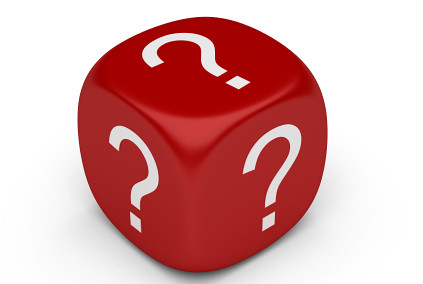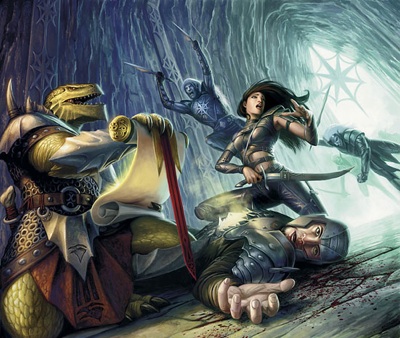
A friend requested that I talk a bit about physical techniques of dice rolling. So get ready for something a little different as we dig into the flick of the wrist and clatter of polygons that determine your fate at the game table. Unlike most articles on this site, this one is primarily directed toward players, the primary dice-chuckers at the game table.
Dice Rolling Rules
These are my core rules of dice rolling. The Do's and Don'ts of the roll to keep your game running smoothly and avoid fumbling for results or having to crawl under the table.
- Don't roll the dice unless it is called for by the DM. This was covered in this previous article. Rolling dice is noisy and distracting and sometimes entirely unnecessary. If you are itching to make a skill check, let the game-runner know before you send 'em flying.
- Don't throw your dice across the table. It's really annoying when your dice knock over the the playing pieces or end up in somebody's drink. Have a small flat-surface area to use as a designated roll area and use it consistently.
- Roll your dice together, not one after the other. Not only does this save time, but it avoids the risk of the second dice crashing into the first dice you roll and changing its result. This was a sneaky maneuver that one of my players pointed out to me in jest, but it's not as funny to actually do this as a goof.
- Combine your rolls when possible. Make attack rolls and damage rolls at the same time. If you trigger an ability that allows you to take the best of two rolls, make them both at the same time. It saves hassle and gives you immediate results.
- Roll on a flat, smooth surface. You want to make dice rolls as clear and legible as possible. You will also need to work out some house rules for when dice fall off the table or land slightly askew. My house rules declare that dice that fall outside the designated roll areas need to be re-rolled, as well as a cocked die that didn't land on a clear result. Your own rulings may vary.
- Always have some spare dice on hand in case yours get lost. For your group, I recommend buying a pound of dice bag from online or at your local game store. Just generic ones of various shapes and sizes so that a missing d8 doesn't bring everything to a grinding halt.
- Show respect for your fellow players dice and don't roll someone else's without their express permission. It's bad form to touch another player's gaming tools.
Dice Rolling tools
The following are basic descriptions of tools you can use to store dice and make rolling easier. Remember that hard surfaces of any kind will eventually wear down your dice and prevent them from rolling quite as consistently, so keep this in mind if you have fancier or more delicate sets. Most of the tools listed here come with padded variations to avoid such issues.

Dice Tray
A dice tray is a simple and elegant solution to keep your dice contained and managed. You can use many kinds of small containers, buy a specialty tray, or make your own with cardboard, cardstock, and maybe some felt lining(for smoother and quieter rolls.) You roll the dice within the confines of the container and it keeps them from flying off. Of course it has to be a flat level surface and be visible to other players at the table (No hiding your dice rolls) I use a small clear plastic container when I need a tray, it fits the criteria just fine. Dice Tower
Dice Tower
This is the Cadillac of your options, and these are sold at many game stores and resources. Basically a standing box with a whole on either end. The dice drop through the top, bounce off a couple of platforms and pop out the bottom where they land on a result. These are great for keeping your dice contained, but also make a fair racket when in use. They also are the hardest on your dice in terms of wear and tear, but they are fun and have undeniable appeal.

Dice Cup
A dice cup holds your dice and can also be flipped over to dump them out and get a quick result. Simple and elegant, they cut right to the chase when it comes to getting your result. Flip the cup over and see what you got. Leather dice cups are a popular version, and having one with a lid lets it double as a dice bag.

Dice Bag
While it is exclusively a storage option, a dice bag is important to players who want to keep their pieces seperate and protected. A simple little sack large enough for one or more sets of dice is best, with a drawstring to keep it closed. Some folks like the chain mail variations, but it is just a matter of taste. Whatever works best for you and feels right.
Happy ventures!


















